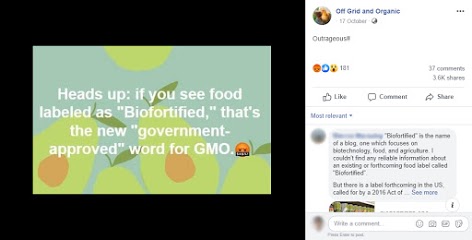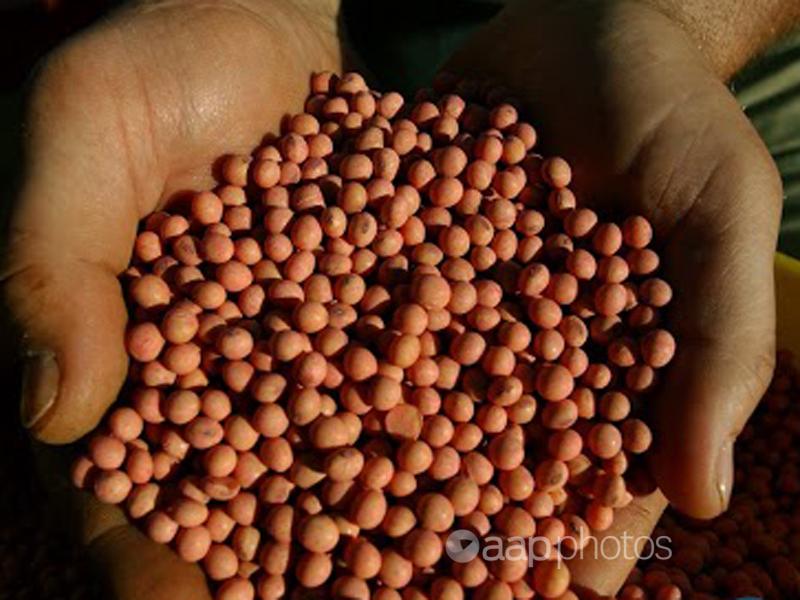The Statement
AAP FactCheck examined a Facebook post from October 17, 2019 by Off Grid and Organic which claims that “biofortified” is a new term used to describe GMO (Genetically Modified Organism) products.

The text, which appears in front of a green background and images of fruit, reads, “Heads up: if you see food labelled as “Biofortified,” that’s the new “government approved” word for GMO.”
The Off Grid and Organic page has more than 11,000 likes on Facebook and describes itself as a “Gardening, animal hoarding, cooking, canning, fermenting, raising awesome kids it’s all going on here! :)” page.
The post has been shared more than 3600 times and has attracted more than 30 comments and 180 reactions.
The Analysis
The first major GMO crop – herbicide-resistant soybeans – was introduced to the market in the mid-1990s. Genetic modification involves altering the genetic material in plants, animals or microorganisms in a way that does not naturally occur normally through mating or reproduction and allows “selected individual genes” to be transferred from one organism to another and inter-species, according to the World Health Organisation.
Products are genetically modified to improve their durability and nutritional value at a lower cost. Genetic modification can also increase crop resistance to diseases.
In Australia, three types of GM crops are grown commercially, according to the Department of Primary Industries and Regional Development. GM cotton crops are insect-resistant and herbicide-tolerant. GM canola is herbicide-tolerant and has a high omega-3 oil content, and GM safflower, which is cultivated for vegetable oil, has a super high amount of oleic acid.
Organisations including Greenpeace have expressed concerns about the rise of GMO products, arguing the practice could adversely impact people and the environment.
Greenpeace in the United States claims that “genetically engineered crops directly promote an industrial and chemical-intensive model of farming harmful to people, the environment, and wildlife”.
The World Health Organisation (WHO) states the safety of GMO products should be “addressed on a case-by-case basis” but says the GMO products “currently available on the international market have passed safety assessments and are not likely to present risks for human health”.
“In addition, no effects on human health have been shown as a result of the consumption of such foods by the general population in the countries where they have been approved.”
Biofortification, according to the WHO, is the process of nutritionally enhancing food crops through agronomic practices such as managing crops to promote soil and water conservation, conventional plant breeding and modern biotechnology, which can include GMO. The WHO states the aim of biofortification is to “increase nutrient in crops during plant growth rather than through manual means during processing of the crops”.
Examples of biofortified foods include rice, beans and sweet potatoes with increased levels of iron or zinc depending on the type of biofortification.
Associate Professor Alex Johnson, a plant biologist specialising in plant nutrition and biofortification at the University of Melbourne told AAP FactCheck the statement in the post is “completely false”.
Dr Johnson said the post confused the word “biofortified” with “bioengineered”, a term the US Department of Agriculture adopted in 2018 to describe that contain detectable genetic material that has been modified through lab techniques.
Regarding the post’s claim that “biofortified” is another word for GMO, Dr Johnson said “a biofortified crop could be a GMO or not, depending on how it was developed”.
“For the moment most biofortified crops are not GMOs,” he said.
The Verdict
Based on the evidence, AAP FactCheck has ranked the Facebook post partly false in that its claims are a mixture of accurate and inaccurate. The post incorrectly states the word “biofortified” is the new “government approved” word for “GMO”. The US Department of Agriculture has in fact adopted the term “bioengineered” to refer to foods containing lab-modified genetic material. The term “biofortified” can include genetic modification but also covers other, non-GMO methods for improving the nutritional quality of crops.
Partly False – The claim of the content is a mixture of accurate and inaccurate, or the primary claim is misleading or incomplete.
* AAP FactCheck is an accredited member of the International Fact-Checking Network. To keep up with our latest fact checks, follow us on Facebook, Twitter and Instagram.
First published October 29, 2019, 17:23 AEST


















